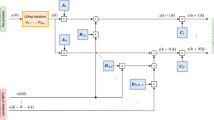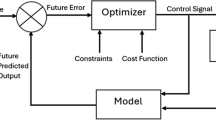Abstract
This article proposes a characteristic model-based adaptive fault tolerant control scheme to deal with actuator failure in four-motor synchronization systems, which usually causes sudden inertia ratio change and backlash increase. Firstly, the characteristic modeling method is applied into servo system to obtain a simplified system model without losing high-order features. Also, this model could reflect real-time system status through three characteristic parameters. Secondly, a particle swarm optimization algorithm-based estimator is designed to identify characteristic parameters online. By this way, the characteristic model could react to inertia ratio changes quickly and eliminate its negative effect in signal tracking. Thirdly, an improved adaptive electric anti-backlash method is used to restrain backlash. Compared to regular anti-backlash technique, this adaptive one uses a neural network-based fault detector to monitor motors and adjust bias current according to different actuator status, even when one motor breaks down. With these three steps combined, a fast terminal sliding mode controller is finally designed as fault tolerant controller and the stability of this closed-loop system is guaranteed by Lyapunov stability theorem. At last, the simulation and experiment results prove the effectiveness of the proposed control scheme in system control and fault tolerance.
Similar content being viewed by others
References
N. Zhao and J. D. Zhu, “Sliding mode control for robust consensus of general linear uncertain multi-agent systems,” International Journal of Control, Automation & Systems, vol. 18, no. 8, pp. 2170–2175, Aug 2020.
H. J. Liang, G. L. Liu, H. G. Zhang, and T. W. Huang, “Neural-network-based event-triggered adaptive control of nonaffine nonlinear multiagent systems with dynamic uncertainties,” IEEE Transactions on Neural Networks & Learning Systems, vol. 12, no. 5, pp. 1–12, Jul 2020.
D. Zhou, A. Zhang, and P. Yang, “Fixed-time output feedback consensus of second-order multi-agent systems with settling time estimation,” International Journal of Control, Automation & Systems, vol. 18, no. 8, pp. 2061–2074, Feb 2020.
Y. N. Pan, P. H. Du, H. Xue, and H. K. Lam, “Singularity-free fixed-time fuzzy control for robotic systems with user-defined performance,” IEEE Transactions on Fuzzy Systems, vol. 12, pp. 1–12, Jun 2021.
P. H. Du, Y. N. Pan, H. Y. Li, and H. K. Lam, “Nonsingular finite-time event-triggered fuzzy control for large-scale nonlinear systems,” IEEE Transactions on Fuzzy Systems, vol. 12, pp. 26–32, May 2020.
Y. K. Tao, F. F. Yang, P. He, C. S. Li, and Y. Q. Ji, “Distributed adaptive neural consensus control for stochastic nonlinear multiagent systems with whole state delays and multiple constraints,” International Journal of Control, Automation & Systems, vol. 18, pp. 2398–2410, Feb 2020.
X. Wang, Y. F. Wu, E. Z. Zhang, J. Guo, and Q. W. Chen, “Characteristic model-based adaptive controller with discrete extended state observer for servo systems,” Proceedings of the Institution of Mechanical Engineers. Part I: Journal of Systems & Control Engineering, vol. 231, no. 4, pp. 259–270, 2017.
Y. Gao, Y. F. Wu, X. Wang, and Q. W. Chen, “Characteristic model-based adaptive control with genetic algorithm estimators for four-PMSM synchronization system,” International Journal of Control, Automation & Systems, vol. 18, no. 8, pp. 1605–1616, 2020.
X. A. Chu and M. G. Li, “Event-triggered fault estimation and sliding mode fault-tolerant control for a class of nonlinear networked control systems,” Journal of the Franklin Institute, vol. 355, no. 13, pp. 5475–5502, Sep 2018.
L. S. Huang, D. K. Qu, and F. Xu, “Adjustable inertia ratio control for low-frequency torsional resonance suppression in industrial servo system,” Proc. of International Conference on Measuring Technology & Mechatronics Automation, IEEE, pp. 432–435, March 2010.
A. Ma, C. Kim, and S. Kim, “Parametric model of servo-hydraulic actuator coupled with a nonlinear system: Experimental validation,” Mechanical Systems & Signal Processing, vol. 104, pp. 663–672, May 2018.
H. Wu, J. Hu, and Y. Xie, Characteristic Model-based Intelligent Adaptive Control, China Science & Technology Press, pp. 82–96, Beijing Press, China, 2009.
H. Wu, J. Hu, and Y. Xie, “Characteristic model-based all-coefficient adaptive control method and its applications,” IEEE Trans. on Systems, Man & Cybernetics Part C, vol. 37, no. 2, pp. 213–221, March 2007.
X. Wang, Y. F. Wu, E. Z. Zhang, J. Guo, and Q. W. Chen, “Characteristic modelbased adaptive controller with discrete extended state observer for servo systems,” Proc. Inst. Mech, vol. 231, no. 4, pp. 259–270, 2017.
X. Wang, Y. F. Wu, J. Guo, Q. W. Chen, “Adaptive terminal slidingmode controller based on characteristic model for gear transmission servo systems,” Trans. of the Institute of Measurement and Control, vol. 41, no. 1, pp. 219–234. Jan 2019.
Y. F. Chang, T. T. Jiang, and Z. Q. Pu, “Adaptive control of hypersonic vehicles based on characteristic models with fuzzy neural network estimators,” Aerospace Science & Technology, vol. 68, no. 4, pp. 475–485, Sep 2017.
K. Laila, N. Benayad, and B. Azeddine, “A hybrid particle swarm optimization algorithm for the capacitated location routing problem,” International Journal of Intelligent Computing & Cybernetics, vol. 11, no. 1, pp. 106–120, March 2018.
B. Roshanravan, H. Aghajani, M. Yousefi, and O. Kreuzer, “Particle swarm optimization algorithm for neuro-fuzzy prospectivity analysis using continuously weighted spatial exploration data,” Natural Resources Research, vol. 28, no. 2, pp. 309–325, April 2019.
A. B. Laxmi, V. C. Prakash, and U. S. Sagar, “Production scheduling optimization in foundry using hybrid particle swarm optimization algorithm,” Procedia Manufacturing, vol. 22, pp. 57–64, April 2018.
G. Y. Lai, C. Y. Wen, Z. Liu, Y. Zhang, C. L. P. Chen, and S. L. Xie, “Adaptive inverse compensation for actuator backlash with piecewise time-varying parameters,” International Journal of Control, vol. 91, no. 2, pp. 337–345, Feb 2018.
R. Gun, S. Kim, and K. Jung, “Backlash compensation for accurate control of biopsy needle manipulators having long cable transmission,” International Journal of Precision Engineering & Manufacturing, vol. 19, no. 5, pp. 675–684, May 2018.
L. Truong, S. D. Huang, V. Yen, and P. V. Cuong, “Adaptive trajectory neural network tracking control for industrial robot manipulators with deadzone robust compensator,” International Journal of Control, Automation & Systems, vol. 18, no. 4, pp. 2423–2434, 2020.
H. P. Ren and B. He, “Anti-backlash control of machine tool feed system driven by dual-motors,” Electric Machines & Control, vol. 18, no. 3, pp. 60–66, March 2014.
D. R. Maria and W. P. Heath, “Backlash compensation for plants with saturating actuators,” Proceedings of the Institution of Mechanical Engineers. Part I: Journal of Systems & Control Engineering, vol. 231. no. 6, pp. 471–480, July 2017.
S. S. Han, H. P. Wang, Y. Tian, and N. Christov, “Time-delay estimation based computed torque control with robust adaptive RBF neural network compensator for a rehabilitation exoskeleton,” ISA Transactions, vol. 97, pp. 171–181, 2020.
S. S. Han, H. P. Wang, and Y. Tian, “A linear discrete-time extended state observer-based intelligent PD controller for a 12 DOFs lower limb exoskeleton LLE-RePA,” Mechanical Systems & Signal Processing, vol. 138, pp. 106547, 2020.
Y. F. Wu, Research and Implementation of a Kind of Servo Systems Driven by Multi Motors Synchronously Based on Characteristic Modeling, NJUST Press, pp. 67–72, 2014.
H. Du, X. Chen, and G. Wen, “Discrete-time fast terminal sliding mode control for permanent magnet linear motor,” IEEE Trans. on Industrial Electronics, vol. 1, no. 1, pp. 99, March 2018.
S. H. Li, H. B. Du, and X. H. Yu, “Discrete-time terminal sliding mode control systems based on Euler’s discretization,” IEEE Trans. Automatic Control, vol. 59, no. 2, pp. 546–552, 2014.
J. Xie, S. Zhao, Z. Sha, and L. Jintao, “Position servo control of the slider in double toggle mechanical press using Bezier curve model and fuzzy control,” Proc. of International Conference on IEEE Trans. Autom. Sci. Eng., pp. 773–778, 2011.
Author information
Authors and Affiliations
Corresponding author
Additional information
Publisher’s Note Springer Nature remains neutral with regard to jurisdictional claims in published maps and institutional affiliations.
This work was supported by the National Natural Science Foundation of China under Grant 61333008 and National Defense Basic Scientific Research Program of China under Grant JCKY2019606D001.
Yang Gao is a Ph.D. student in the School of Automation, Nanjing University of Science & Technology. His research interests include adaptive control, servo system, characteristic model methodology and system identification.
Jiali Ma is a Ph.D. student in the School of Automation, Nanjing University of Science & Technology. His research interests include multi-agent system control.
Qingwei Chen is a Professor in the School of Automation, Nanjing University of Science & Technology. His research interests include servo system control, fuzzy control, integrated navigation and nonlinear system control.
Yifei Wu is a Professor in the School of Automation, Nanjing University of Science & Technology. His research interests include servo system control, intelligent robots and integrated navigation.
Rights and permissions
About this article
Cite this article
Gao, Y., Ma, J., Chen, Q. et al. Characteristic Model-based Adaptive Fault Tolerant Control for Four-motor Synchronization Systems Considering Actuator Failure. Int. J. Control Autom. Syst. 19, 4010–4024 (2021). https://doi.org/10.1007/s12555-020-0643-y
Received:
Revised:
Accepted:
Published:
Issue Date:
DOI: https://doi.org/10.1007/s12555-020-0643-y




